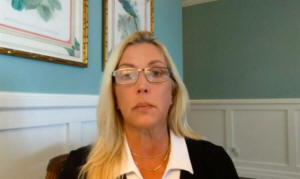Bill calls for rapid on-site visit policy after deadly outbreak at
LaSalle Veterans’ Home
 Send a link to a friend
Send a link to a friend
[March 02, 2021]
By SARAH MANSUR
Capitol News Illinois
smansur@capitolnewsillinois.com
 SPRINGFIELD — Two Republican lawmakers on
Monday unveiled legislation to strengthen internal policies at state-run
veterans homes in the case of a disease outbreak, such as the COVID-19
outbreak at the LaSalle Veterans’ Home that resulted in 36 resident
deaths since the pandemic began. SPRINGFIELD — Two Republican lawmakers on
Monday unveiled legislation to strengthen internal policies at state-run
veterans homes in the case of a disease outbreak, such as the COVID-19
outbreak at the LaSalle Veterans’ Home that resulted in 36 resident
deaths since the pandemic began.
The bill, sponsored by Republican Sen. Sue Rezin, defines an outbreak at
a state veterans home as two or more staff or residents at the facility
contracting an infectious disease within 48 hours of the first
diagnosis.
Senate Bill 2251 would require the Illinois Department of Veterans
Affairs and Illinois Department of Public Health to conduct an on-site
visit at a veterans home where an outbreak has occurred no later than
the following business day after the home staff or administrator was
notified.

Rezin, of Morris, said state officials with IDPH and IDVA were too slow
to react at LaSalle because they did not conduct an on-site visit there
until 12 days after the outbreak was reported on Nov. 1.
By Nov. 7, test results showed 22 residents and seven staff were
positive. By Nov. 8, 59 residents and 64 staff tested positive for
COVID-19. The facility reported seven resident deaths on Nov. 11.
“I would say that if we were able to go on site immediately and
recognize that mitigation protocol was not being followed, we could have
slowed this outbreak,” Rezin said during a Zoom news conference Monday.
SB 2251 would also mandate that IDVA post online the findings of its
on-site inspection, as well as corrective actions needed, the dates of
follow-up visits, and the initial and follow-up reports from the on-site
visit.
Rep. David Welter, also of Morris, introduced a House resolution calling
for the Illinois auditor general to conduct an investigation into the
deaths at LaSalle, rather the acting inspector general of the Illinois
Department of Human Services, who is currently tasked with the
investigation.
Welter said Auditor General Frank Mautino should take over the
investigation because the auditor general is appointed by the
Legislative Audit Commission, a bipartisan committee of House and Senate
members, not the governor.
“That is really where we want to see this investigation go — an
independent party who is impartial on this and not being paid or hired
by the governor,” Welter said during the Zoom conference.
Both Welter and Rezin represent districts that include the LaSalle home.
During the initial Nov. 12 visit at the LaSalle home, a U.S. Department
of Veterans Affairs official noted several violations of protocols
mandated by the Centers for Disease Control and Prevention, including
the use of hand sanitizer containers that had a non-alcohol-based
product.
[to top of second column]
|

Sen. Sue Rezin, R-Morris, unveiled new legislation
aimed at strengthening internal protections for residents at
veterans homes that are experiencing disease outbreaks, during a
Zoom news conference Monday. (credit: Blueroomstream.com)

That site visit report also documented examples of staff failing to
follow proper protocol for personal protective equipment. In one
instance, staff were seen eating with masks below their chins in the
kitchen within six feet of one another. In another example, staff
were observed touching patients and multiple surfaces without using
a new pair of disposable gloves.
Rezin said the legislation she filed is meant to enforce the
recommendations made in the March 2019 Auditor General’s report on
the outbreak of Legionnaires’ disease at the Quincy Veterans Home,
which resulted in 13 resident deaths at Quincy between 2015 and
2018.
Two of those recommendations are that IDPH and IDVA “ensure that
State facilities, such as the Quincy Veterans’ Home, implement all
recommendations from the Centers for Disease Control following
confirmed outbreaks such as Legionnaires’ disease,” and that IDPH
“revisit its policies and determine what response timeframe is
adequate to conduct on-site monitoring visits in response to a
confirmed disease outbreak such as Legionnaires’ disease.”
She said Gov. JB Pritzker failed to follow those recommendations.
“It's very troubling to both Rep. Welter and I that these
recommendations have not been implemented to date with this
administration. If it had, we would have been in the site on day
three at the LaSalle Veterans Home and caught all of these errors
that were happening within the home. And we could have stopped the
outbreak within the home, and we could have saved veterans’ lives,”
Rezin said during Monday’s Zoom conference.
A spokesperson for the governor said in a statement Monday evening
“the administration will work with lawmakers to both strengthen the
emergency response to pandemic-related outbreaks at our veterans
homes and ensure IDPH has the resources it needs to rebuild their
hollowed out state agency that has been on the front lines of this
pandemic response.”

In the statement, the governor’s office indicated an independent
investigation is underway into the pandemic response at the veterans
homes and a report will be made public when it is completed.
Pritzker has said all those who did not follow proper procedures and
protocols will be held accountable, the statement said.
As it pertains to the audit specific to Legionnaire’s disease, the
governor’s office said, IDPH has implemented all recommendations
from the Quincy Veterans’ Home, including a site visit from the
agency within 24 hours of when legionella was detected.
Capitol News Illinois is a nonprofit, nonpartisan
news service covering state government and distributed to more than
400 newspapers statewide. It is funded primarily by the Illinois
Press Foundation and the Robert R. McCormick Foundation. |